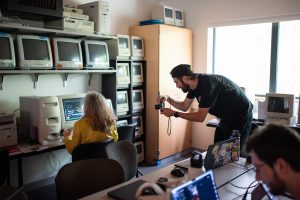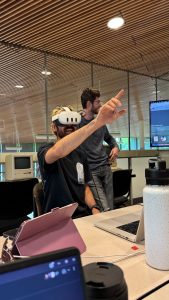 When the email popped up in my inbox in March, I was a bit skeptical: the BBC writing to arrange to talk to me about Microsoft in preparation for an article it was doing about the company’s 50th Anniversary? But it was true, Thomas Germain, the journalist, was reaching out to folks who were using Windows in various ways––and a former lab staff member, Aidan Walker (who has amassed 104.2K followers on TikTok since working in the lab), had suggested to Germain that he may want to talk to us. We miss you, Aidan!
When the email popped up in my inbox in March, I was a bit skeptical: the BBC writing to arrange to talk to me about Microsoft in preparation for an article it was doing about the company’s 50th Anniversary? But it was true, Thomas Germain, the journalist, was reaching out to folks who were using Windows in various ways––and a former lab staff member, Aidan Walker (who has amassed 104.2K followers on TikTok since working in the lab), had suggested to Germain that he may want to talk to us. We miss you, Aidan!
The phone call with Germain turned into a Zoom meeting where I walked around the lab with my Zoom window open, showing him the computers I had been collecting since the early 1990s when I was a graduate student. I had started to use computers in the early 1980s when I was given an IBM and the WordStar program to use for my job at the University of New Orleans. But I started to hold on to computers in the early 1990s so that I could continue to access the born-digital art and literature that needed a 3.5-inch floppy drive. Then, those that needed the CD-ROM drive. And then of course those that needed all of the various operating systems that have been released over the last 30 years. The lab now holds 84 computers, most of them Macs because artists have tended to use that platform and the software created for it. There is a method to our madness.
 Thomas and I got to geek out together for a good hour or more on Zoom. Then, he sent Grant Hindsley, a wonderful photographer working in Seattle, to do a photo shoot of the lab for the article. Grant is also into retro computers and, so, his visit was great fun. The photo to the left is Grant with the Quest 3 on, experiencing the VR environment our XR Programmer, Andrew Thompson (right of Grant in the photo), had just finished for The NEXT.
Thomas and I got to geek out together for a good hour or more on Zoom. Then, he sent Grant Hindsley, a wonderful photographer working in Seattle, to do a photo shoot of the lab for the article. Grant is also into retro computers and, so, his visit was great fun. The photo to the left is Grant with the Quest 3 on, experiencing the VR environment our XR Programmer, Andrew Thompson (right of Grant in the photo), had just finished for The NEXT.
The article, entitled “Still booting after all these years: The people stuck using ancient Windows computers“, came out on May 18 and shows the lab in a very positive light, highlighting the reason why we collect the computers and how we are using Windows in our work. Anyone who has labored long and hard on projects for decades can understand how gratifying it was to see the lab featured in an article for such as terrific news agency.
I should say that in the article I mentioned that the one computer we do not have access to but really needed for some of the games and interactive novels we have collected is a PC with a 5.25-inch floppy disk drive. Once the article came out, there has been an outpouring of support, with people writing me from all over the world––from countries like South Africa, Finland, Poland, Hungary, and others––asking if they can donate the computer to us. It is great to know that there are so many people who feel the same way about our cultural heritage that they also collect computers and are glad to share them with others––well, gratifying does not even capture how I felt when reading the messages.
Read the article!
